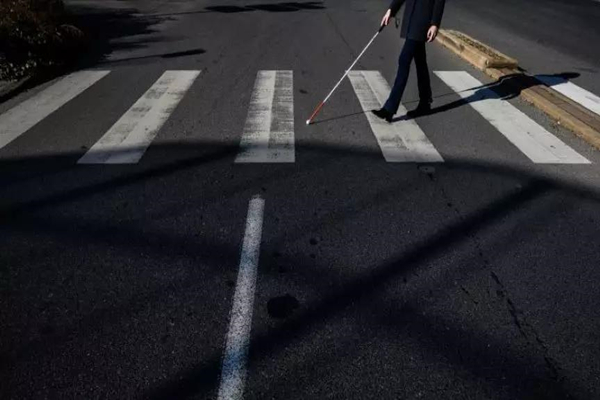盲人真的拥有超听力吗?研究表明,有着超人听力的盲人确实存在,盲人的大脑皮层视觉区域被听觉区域占领,盲人听觉分辨率高于普通人是“功能代偿”的表现。
关键词:科普、译文、盲人、超听力

[Photo: Getty Images]
A new study out Monday suggests that losing your sight early in life can lead to subtle alterations in the brain circuitry primarily responsible for hearing.
周一公布的一项新研究表明,早年失明会导致主要负责听力的大脑回路发生微妙变化。
It’s commonly believed that being born blind or losing your sight early in life can make hearing more sensitive. But while studies have consistently shown that blind people do seem to have more precise hearing in some ways, we don’t know too much about how or where this heightened ability actually shows up in the brain.
人们普遍认为,天生失明或早年失明会使听力变得更灵敏。但是,尽管研究一再表明,盲人在某些方面似乎确实拥有更精确的听力,我们不太清楚这种增强的能力究竟是如何出现在大脑中或在大脑中的哪里出现的。
The authors behind this latest study, published in the Journal of Neuroscience, say theirs is one of the first to look at what’s happening in the auditory cortex of people living with blindness.
发表在《神经科学杂志》上的这项最新研究的作者说,他们的研究是第一批观察失明患者听觉皮层发生变化的研究之一。
“Previous studies have really looked at the behavioral aspects of it, and we’re one of the first to try to tackle it in a more modeled approach,” lead author Kelly Chang, a vision and cognition researcher at the University of Washington, told Gizmodo.
“之前的研究确实着眼于它的行为方面,而我们是第一批尝试用更模型化的方法来解决这个问题的人之一。”该研究的第一作者、华盛顿大学视觉和认知研究员Kelly Chang告诉Gizmodo。
They scanned the auditory cortexes of people who were born blind or developed blindness early in life (including some people with anophthalmia, a condition where the eyes are completely absent) via MRI. They were also scanned as they underwent hearing tests that had them listen to pure tones. These tones were played at different frequencies, and their brain activity in the auditory cortex was measured as they heard these tones. Their results were then compared to a control group with average vision. Everyone involved had average hearing.
他们通过核磁共振成像扫描了先天失明或早年失明的人的听觉皮质(包括一些患有无眼症的人,一种眼睛完全缺失的情况)。研究人员还对他们进行了听力测试,让他们听纯音。这些音调以不同的频率播放,并且在他们听到这些音调时测量他们听觉皮层中的大脑活动。然后将他们的结果与视力正常的对照组进行比较。每个参与者的听力都很正常。
They found that the auditory cortex was similar in both groups, including its size. But there was a distinct difference in one aspect of how blind and sighted people processed sound. In those who were blind, the auditory cortex appeared to be more attuned to frequencies of sound played in the test, based on the kinds of brain activity the researchers saw in the scans.
他们发现两组人的听觉皮层都是相似的,包括它的大小。但是盲人和视力正常的人在处理声音的方式上有一个明显的不同。根据研究人员在扫描中看到的大脑活动类型,盲人的听觉皮层似乎更能适应测试中播放的声音频率。
“Let’s say you wanted to distinguish between a low frequency and high frequency note. For people with sight, that’s actually pretty easy to do, since the notes are very far apart. But in early blind folks, probably because they only have their auditory system to rely on, they’re actually much better at being able to distinguish between very close frequencies,” Chang said.
“假设你想要区分低频和高频音符。对于视力正常的人来说,这其实很容易做到,因为两个音符相距很远。但在早期失明的人中,可能因为他们只有听觉系统可以依靠,他们实际上能够更好地分辨非常接近的频率,“Chang说。
Other research has suggested the brain’s neural connections can reorganize when a person becomes blind, specifically in the areas that usually process sight. This is an example of the brain’s well-known plasticity. But the findings, the authors wrote, provide “some of the first evidence in human subjects” that this compensation can happen in areas of the brain that aren’t directly affected by blindness.
其他研究表明,当一个人失明时,大脑的神经连接可以重组,特别是在通常处理视力的区域。这是一个众所周知的大脑可塑性的例子。但作者写道,这些发现提供了“人类实验中的第一批证据”,证明这种补偿可以发生在大脑中不受失明直接影响的区域。
“Seeing this reorganization in somewhere so fundamental is remarkable,” she said.
她说:“在如此根本的地方看到这种重组是非同寻常的。”
The study’s small sample size (nine subjects in total with early blindness, including five with anophthalmia) means that the team’s findings are far from definitive. But even if they were, there’s still some important questions to figure out, the authors say.
该研究的样本量很小(共有9名早期失明的受试者,其中5名患有无眼症),这意味着该团队的研究结果还远未确定。但即使是这样,仍然有一些重要的问题需要解决,作者说。
For one, there’s the matter of what makes this compensation in the brain’s auditory cortex possible. Previous research, including by Chang’s team, has suggested that these sorts of changes can only happen when someone becomes blind as a child, and does not really occur in those who lose their sight as adults. And maybe it’s not the loss of sight itself that drives this reorganization in the auditory cortex, but a blind person’s need to focus on certain sounds more to navigate around the world. Something else worth studying is how people who become blind early in life process moving sounds and speech—complex noises that require more cooperation between different areas of the brain.
首先,是什么使大脑听觉皮层的这种补偿成为可能。包括Chang的团队在内的先前研究表明,这种变化只有在儿童失明时才会发生,而那些成年后失明的人则不会发生这种变化。也许并不是失明本身推动了听觉皮层的重组,而是盲人需要更多地关注特定的声音来感知世界。另一个值得研究的问题是,早期失明的人是如何处理移动的声音和复杂的声音的,这些声音需要大脑不同区域之间更多的合作。
Future studies untangling these questions, which Chang and others are working on, could examine what happens to the auditory cortex in people who are temporarily blinded. They could also look at people who became blind in adulthood, including those who later regained their sight to some degree.
Chang和其他人正在研究这些问题,未来的研究将解开这些问题,研究暂时失明的人的听觉皮层发生了什么变化。他们也可以观察那些成年后失明的人,包括那些后来在一定程度上恢复了视力的人。
(责任编辑:周姚)
(版权说明,转载自:微信公众号:科学猫科普)

